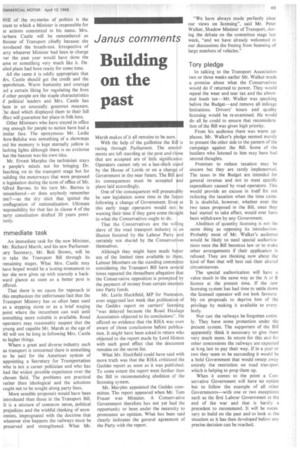)NE of the mysteries of politics is the xtent to
Page 51

If you've noticed an error in this article please click here to report it so we can fix it.
which a Minister is responsible for ie actions committed in his name. Mrs. ;arbara Castle will be remembered as 4inister of Transport chiefly because she itroduced the breath-test. Irrespective of arty whatever Minister had been in charge ver the past year would have done the ame or something very much like it. Deailed plans had been ready for some time.
All the same it is oddly appropriate that 4rs. Castle should get the credit and the )pprobrium. Warm humanity and courage .nd a certain liking for regulating the lives If other people are the staple characteristics If political leaders and Mrs. Castle has hem in an unusually generous measure. he deed which displayed them to their full ffect will guarantee her place in folk-lore.
Other Ministers who have stayed in office ong enough for people to. notice have had a imilar fate. The eponymous Mr. Leslie -lore-Belisha was something of a showman ind his memory is kept eternally yellow in lashing lights although there is no evidence hat the beacon was his own idea.
Mr. Ernest Marples the technician stays n people's minds not for bringing Dr. 3eeching on to the transport stage but for milciing the motorways that were proposed n legislation during the term of office of Mr. klfred Barnes. In his turn Mr. Barnes is -emembered—or does anybody remember tim?—as the dry stick that ignited the amflagration of nationalization. Ultimate -esponsibility for that lies in clause 4 of the ,arty constitution drafted 30 years previously.
mmediate task
An immediate task for the new Minister, Mr. Richard Marsh, and his new Parliamentary Secretary, Mr. Bob Brown, will he to take the Transport Bill through its remaining stages. What Mrs. Castle may have hoped would be a lasting monument to her she now gives up with scarcely a backward glance as soon as a better post is offered.
That there is no cause for reproach in this emphasizes the unfortunate fact that the Transport Ministry has so often been used as a stepping stone or as a brief staging point where the incumbent can wait until something more suitable is available. Road operators may reasonably suspect that the young and capable Mr. Marsh at the age of 40 will not be long in following Mrs. Castle to higher things.
Where a great and diverse industry such as transport is concerned there is something to be said for the American system of appointing a Secretary for Transportation who is not a career politician and who has had the widest possible experience over the chosen field. The problems are practical rather than ideological and the solutions ought not to be sought along party lines.
More sensible proposals would have been introduced than those in the Transport Bill. It is a mixture of common sense, political prejudices and the wishful thinking of economists, impregnated with the doctrine that whatever else happens the railways must be preserved and strengthened. What Mr.




































































































